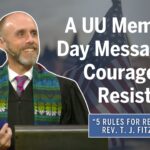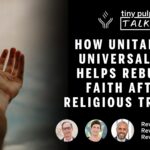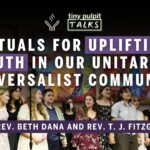Foundations: Giants Like Goliath | Rev. Dr. Daniel Kanter | 08.25.2024
Sermon Transcript
Well, what’s the biggest hurdle that you’ve faced in your life? I know that’s a big question. For some of you, it will … The answer will come easily. For others, it will take a moment. But life hurdles are something we all face.
I know because I’m your minister, and then you have sat in my office and told me about them on occasion. I have heard stories that ranged from cancer diagnoses to grief, to divorce, to getting the right job, to feeling suicidal, and on and on. We all have these life hurdles, figurative mountains to climb, spiritual challenges that loom large, and sometimes we believe in them so much that they can conquer us before we can even approach them.
Mine have included things like defending a doctoral degree and grief of all sorts and disbelief in myself and my career choice more than once. The list probably goes on.
Mountains. Hurdles. Goliaths. You see, we all have them, of course, and of course there are stories that help us relate to these moments in our lives. Help us ponder them.
That is mostly what the useful parts of the Bible are. Stories of human struggle shaped into metaphors for our lives and for the lives of the people who wrote them thousands of years ago. That is why the story today of David and Goliath is not history. It’s not literal, and anyone who tells you it is is probably delusional, in my book, but is more about us, yet forged thousands of years ago.
The Philistines and the Israelites were long-standing enemies. Anybody have long-standing enemies inside them? The Philistines’ champion was a giant called Goliath. He was nearly 10-feet tall. His armor weighed 100 pounds. The tip of his spear was heavier than an Olympic shot put. The shaft of his spear the size of a roof rafter. This was no ordinary soldier, and then he would issue his challenge, “I will fight your best soldier.”
The Bible says, “When Saul and all Israel heard these words of the Philistine, they were dismayed and greatly afraid.” Israel did not have a champion to face Goliath. Goliath repeated his challenge every day for 40 days, that magic biblical number. Israel had no champion to respond. Then young David was sent by his father to bring food to the front, to his three older brothers who were soldiers in Saul’s army, and when David arrived, he saw Goliath and came forward, heard his challenge, and said, “I will fight.”
All the soldiers fled from Goliath, but David stood firm. I want to stop there and say this is not commentary on modern-day Israel. This isn’t commentary on the US election. Maybe. This is ancient lore. This is ancient lore we’re talking about. This is giants being confronted by unlikely heroes. This is you facing whatever you are facing. This is fear in the face of reality, asking what optimism there is to count on in those moments. This is eventually going to return to James Luther Adams and his smooth stones in the foundations of Unitarian theology. Just hang on.
But the story is too good to just a moment here. David was underaged, undersized, and under-experienced. He was a shepherd boy, yet he walked out to meet Goliath with his staff and a slingshot and a pocket full of smooth stones he had selected from the riverbed.
Goliath laughed at him. Then David’s stone hit Goliath in the center of his forehead, and Goliath fell to the ground, not laughing, not breathing. David was victorious.
Of course, in the Bible, in the literature, this is all to set up King David eventually. We love to make myths of our leaders bigger than they are. Some leaders like to make up myths about who they are that are bigger than reality. Some leaders like to do what … I would quote a former president said make up stories about crowd size to make themselves bigger. They make up stories about who they are so that we believe in them. This is not commentary on the US election. This is myth.
This is myth. Myth asks bigger questions about who we are. About who you are. It asks what giants you are facing aging in the last years of your life. Parenting the unruly. I know something about that. Decisions about relationships or careers. Grief that feels too heavy to carry around. Illness or caring for someone terminal. Giants or projects. Priorities.
You have your own list. Because the truth is that we all face giants in varying proportions. Giants that cause fear and trembling. Giants that cause anger and outrage. Giants that cause pain and suffering. Giants that bring despair and hopelessness. Giants that require us to make very difficult decisions.
As a community, the giants we face are equally formidable here in Texas. We face a war in the Middle East as a nation, as a people, in the very place where these biblical stories took place. No end to this war. Millions of dollars and thousands of lives taken, and it all threatens to tear us apart.
We face increases in oppressive rules and laws around people of color and poor people and non-heterosexual people everywhere. We face threats of the breakdown of the division of church and state leaning in the favor of Christianity and things like our public schools.
We face the threat of a national agenda that favors the already advantaged that may strangle the lives of our children. For seven generations, we face the threat of global environmental degradation. We face the threat of religious extremists who seem to want to make the laws in Texas. The global and the national list and the state list go on, but the personal lists are also real.
Giants. Goliaths. And I am here to tell you that our faith is here to help us face and disarm these giants that threaten us. Our faith gives us resources and tools to meet these giants. In some cases, prevail.
In this series, we’re looking at the work of James Luther Adams, one of the main theologians in our faith and this, his fifth stone of the foundations, which was called ultimate optimism. It doesn’t matter if it’s fifth or first. It’s called ultimate optimism, to which I go to very cautiously. There’s so many warnings about optimism.
Nobel Prize winner Daniel Kahneman has said most of us view the world as more benign than it really is, our abilities, our own attributes, as more favorable than they truly are, and our goals we adopt as more achievable than they’re likely to be. We also tend to exaggerate our ability to forecast the future, which fosters overconfidence. In terms of its consequence for the decisions, the optimistic bias may well be the most significant cognitive bias we have. He goes on to say optimism helps with your health and your well-being but to be cautious of optimism because it leads to adverse effects as well. He says that is called the overconfidence bias. This is not commentary on the election.
He says we are likely to think of ourselves not only as better drivers and planners, men in the room, than we really are. We may also overestimate our helpfulness, kindness, honesty, and other moral traits. We may just assume that we are the good folks and therefore take our foot off the gas of the compassion vehicle or not work thoughtfully and diligently to be the good folks. That was my words.
We can believe that we will win and so not put our shoulder to the wheel to make it happen. You get what I’m saying?
We saw this during COVID. We’ve seen this in elections in many places. Optimism isn’t blind hope when it comes to faith. James Luther Adams has something to say to us in this stone. He says, “Liberalism holds the resource.” When he says liberalism, he means Unitarian Universalist religion. “Holds the resources divine and human that are available for the achievement of meaningful change that justify an attitude of ultimate optimism.” Give me another second to explain this. He goes on, and he says, “This view does not necessarily involve immediate optimism, for we recognize the possible or probable existence of evil and suffering at any given moment. Still, there is something in the genuine liberal perspective that, while recognizing this tragic nature of the human condition, continues to live with the dynamic optimism as the only viable attitude for the long run.”
Our optimism is not idealism, in other words. Our optimism is based on a belief born of both divine and human experience. That humanity is not cursed. That human history will not necessarily end in some great Armageddon war of suffering and despair. That we are not miserable sinners in the hands of an angry God who need interlocutors. These are core beliefs of Unitarian Universalism.
Our optimism is based on the belief that all people are worthy and have dignity and are worth of respect.
That below the surface of even the most difficult person you know or read about or see on TV … That there is goodness, however covered over by tar of hatred and pain in their soul. That there is goodness. These are core Unitarian beliefs.
Our optimism grows out of the prophetic tradition of the Hebrew prophets that, in the life and message of Jesus and his followers who proclaimed no one is unworthy, that we must there follow that notion that no one is unworthy.
It continues with the prophetic leaders of our time. Those who lead the way toward justice and liberty for all who see below the surface of our neglect of each other and our violence and the inequalities that we have created or let happen and still sees the potential for change. I think we saw some of that on TV this week. Our faith being expressed in different modes.
Adam’s prophetic religion is one that requires an ultimate optimism. Or if I had my way, I would say an ultimate sense of possibility.
I’m going to quote him again. I know it’s a little hard to catch, but stick with me. He says, “The affirmative answer of prophetic religion, which may be heard in the very midst of the doom that threatens like thunder, is that history is a struggle. It’s a struggle between justice and injustice. Looking towards the ultimate victory and the promise and fulfillment of grace. Anyone who does not enter into that struggle with the affirmation of love,” Adam says, “and beauty misses the mark and thwarts creation as well as self-creation.”
The fifth smooth stone may be the one that stayed in David’s pouch as he slew Goliath because he didn’t need to fling it. He knew it was there reassuring him as he approached the giant in front of him. The smooth stone of possibility which sees through cynicism, which breaks through all fears of the giants that plague us, and fights to see what can be.
It lives also in uncertainty. Do you think David was certain his stone would hit Goliath and in the center of his forehead and kill him? No. It lives, like our faith, in uncertainty because that part is so important. It allows us to point to those who assert that they know what is true and know what will happen and say they know little of the real world.
Adams was famous in saying, “Anyone who knows the tired skeptics, the very violence of their assertiveness, bespeaks an inner uncertainty and a compensation in the form of pseudo certitude.” He said, “There is nothing like a jellyfish, or there is nothing a jellyfish wants so much as a rock.”
His optimism. My possibility is saying that, in the face of giants, we do not cower. We work. We do not hide behind certainty. We know something deeper is always there to uncover. We do not shrink back but face the giant in the broad daylight of our lives even when others fail in courage.
JLA, James Luther Adams’, optimism and my possible-ism, I don’t even know if that’s a word, leads us to work to maintain our attitude of inclusion and love in all we do, not to shrink into the hateful places of fear of the future.
Giants come to us uninvited. They can be big, and they can be armored, and they can appear to be unbeatable, but they also underestimate the power of faith and commitment in people who do not view the world as a miserable conglomeration of pain but see it as a place of beauty and full of potential.
Giants can underestimate the power of a stone polished by hundreds of years of people who believed in the goodness of humanity and the goodness of a God that can’t be boxed up easily. That’s us.
Giants underestimate the faith of a small band of Unitarians who aren’t afraid to name the truths they see and to explore possibilities, knowing that we could be wrong yet are willing to adapt and change and move with the flow of the sea, not seeking the rocks of certainty.
That’s, in part, who we are, friends. That is, in part, our strength. Possibility forever expands for those who see ways to make the world better and right and have faith, not in calcified beliefs but in adaptable theologies. That’s who we are.
You see, in the story, Goliath had all the bluster, but David had all the skill and the adaptability. Beyond that, he had a vision that never died. That would come out when he was the king as he danced down main street, beating a tambourine, singing joy, not hate will always win.
Joy in David’s heart, despite his many faults, would win because he never gave up on that vision. David’s faults and all that might be another sermon, but for now, keep the faith, friends. Possibility in your heart. Nothing can destroy us if we don’t let it.
Amen and amen.








